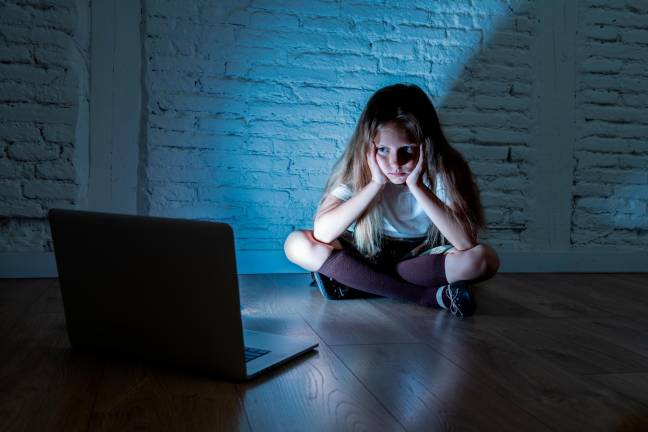Cyberbullying

By Cameron Quinn, Jacqueline Smith, Morgan Sheridan, Kristen Desrats, Elizabeth Centorrino, Charlotte O’Connor, and Max Berryman, Warwick Valley High School
Middle school students have a tougher time with social media than ever before because of their increased exposure at younger ages.
While younger students may not be consciously aware of the consequences of that exposure, they are developing unrealistic and materialistic expectations they may not be able to live up to, or need to live up to. As they go through the changes of puberty, kids often feel they are “on a stage,” with everyone around them judging them under a spotlight. Social media, with the greater exposure that comes with it, really does put them under that spotlight. Kids have the power to control their image on social media and what others can see about their lives. They can remake themselves into a whole different person. Facetune and other editing apps can make them look perfect. But social media also conceals and feeds their insecurities, which grow rapidly at this time of change. Notifications are always alerting you to the presence of your phone. It can get addictive. People want to be part of something, whether it’s good or not.
Kids in middle school have greater innocence too about the dangers of real life. All children ar different and have been through their own life experiences and traumas, leading them to develop their own points of view. But by seeing everything through the screen, they are missing out on life’s true joys. They miss out on being in the moment, embracing the “now,” rather than creating an on-screen persona for an audience. Puberty makes you feel like you’re “weird” or out of place, but everyone is really the same. And you wouldn’t realize that if you consumed life only through social media.
Recent changes
Most people now get their first phones in middle school, or even earlier, as young as third grade. The downside becomes clear only over time. While high schoolers are more mature, they also know how to use deception more skillfully than a middle school student does. That makes cyberbullying more indirect and more dangerous. You might become paranoid. You can’t rely on “ignorance is bliss” to protect you. In a few short years, new apps and new social media have given rise to more anonymous ways of bullying.
Genuine emotion cannot be conveyed through text. Someone may post something meant to be a compliment but that can leave you feeling unsure, or, someone may say “You’re so fake,” or even “I hate you,” and just mean it as a lighthearted joke. The joke might be obvious face to face but not on social media. Overthinking a casual post can consume a teen’s mind, whether she’s on the younger or older side. In addition, social media exchanges have become more vicious over time. People don’t feel the consequences of their actions. Being mean to others gets to seem more and more normal. Words start to lose their meaning.
What can be done about these problems?
Parents can control when their kids get on social media and how they use it. Getting on social media when your brain is still developing instills insecurities that are hard to shake off later.
Take social media breaks temporarily to stop that constant feeling of “FOMO” (fear of missing out).
Remember that everyone is more worried about their own image and not paying as much attention to you as you think they are.
Most importantly, avoid gossip, be positive and surround yourself with positive people, and spread happiness!
Social media exchanges have become more vicious over time. People don’t feel the consequences of their actions. Being mean to others gets to seem more and more normal. Words start to lose their meaning.”